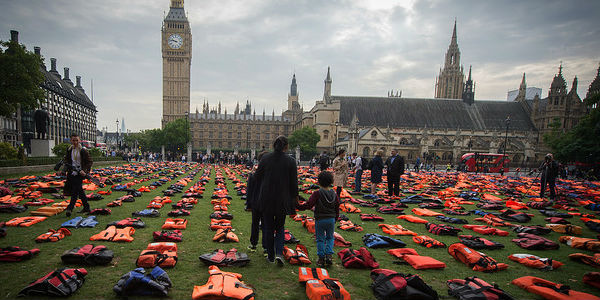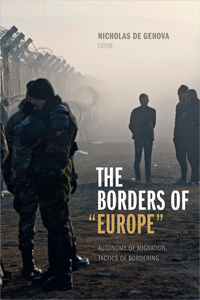Book Review | The Borders of ‘Europe’: Autonomy of Migration, Tactics of Bordering edited by Nicholas De Genova
The collection The Borders of ‘Europe’: Autonomy of Migration, Tactics of Bordering, edited by Nicholas De Genova, offers a compelling in-depth analysis of immigration to Europe through contributions that repeatedly go to the heart of contemporary policy conundrums. Suggesting ways in which scholar-activists can make a potential difference, this book offers a thorough education in the implications of Europe’s evolving, unwieldy border apparatus upon the lives of migrants and Europeans, recommends Paul Clewett.

2,500 life jackets worn by refugees crossing to Europe, placed in Parliament Square, 2016. Photo: ©Mazur/catholicnews.org.uk, via (CC BY-NC-SA 2.0)
The Borders of ‘Europe’: Autonomy of Migration, Tactics of Bordering. Nicholas De Genova (ed.). Duke University Press. 2017.
How do deaths at our borders – and the ‘callous disregard [or] sanctimonious hypocrisy’ that permit them to happen – define Europe and those who live here? The Borders of ‘Europe’: Autonomy of Migration, Tactics of Bordering is a compelling, in-depth analysis of immigration to Europe at a time when we have become accustomed to simplistic narratives around ‘migration’ and ‘crisis’.
Nicholas De Genova’s compilation coincides with the emergence of the Mediterranean as one of the world’s busiest and deadliest irregular border crossings and a floundering European response. Its commitment to human rights as an area of ‘justice, freedom and security’ and global trade jostles for position with militarised borders and citizen surveillance that kill migrants and divide its own societies.
While not the primary focus, the essays repeatedly go to the heart of contemporary policy conundrums. Clara Lecadet’s examination of activist West African return associations shines light on life after deportation from Europe, postioning returnees as a growing political force. At a time when European-driven ‘migration partnerships’ with origin countries are proliferating, it asks whether returnees may yet become a thorn in the EU’s side. Meanwhile, Souad Osseiran digs into (Syrian) refugees’ perceptions of Europe, and the complex decision-making that determines routes and destinations within Europe. She shows how Europe is far from understanding how its own policies are seen by migrants – a gap it must close if its asylum systems are to be deemed both humane and effective.
The rise to media prominence and equally rapid disappearance of Aylan Kurdi, the Syrian child drowned off the Turkish coast, shows how banalised tragedy and hardship at the border have become. Yet Maurice Stierl’s description of discussions in small rooms in Athens speaks loudly to the horrors of ‘homelessness, loss, murder, rape’. The bleak outlook for those ‘not of concern’ in Glenda Garrelli and Martina Tazzioli’s discussion of the post-UNHCR Tunisian refugee camp in Choucha is the second notable example of how this collection of essays skillfully balances the abstract and human sides of border struggles.
Other chapters point to ways in which scholar-activists can make a difference – refreshing given the seemingly intractable nature of some of these issues. Charles Heller and Lorenzo Pezzani’s superb investigative piece turns border surveillance technology on authorities, tracing responsibility for 63 migrants who died in the Mediterranean Sea to those who refused to help. This is states’ ability to ‘selectively apply’ their rights and obligations at the border, echoed in the almost arbitrary administration of Schengen visas by consular officers in third countries (Stephan Scheel) and the ‘strategic deployment’ of labour law inside European territory (Evelina Gambino). Ruben Andersson’s analysis of the blurred boundaries between humanitarianism and law enforcement in state-led search and rescue continues the theme.
The time between fieldwork and publication might have dated the essays given rapid developments in the EU migration and asylum space, but here this works in their favour, giving valuable historical perspective to current, short-term thinking about migration and the border. Nicolas Sarkozy’s threats to Greece over Schengen in 2012 (Stierl) and calls by the UK government for citizens to help enforce the border in 2011 (Dace Dzenovska) remind us that the problems we attribute to the 2015 ‘crisis’ pre-date it by far.
Indeed, some aspects of the crisis have been decades in the making. Laia Soto Bermant puts the tension between commerce, the border and Spanish visa restrictions on Moroccans (1991) in Melilla in fascinating historical perspective. Going further back, Gambino connects the systematic creation of exploitable labour in Puglia’s ghettos to Europe’s colonial past. Have we really moved on so little?
A useful addition to the book might have been more discussion on the nuances of Europe’s identity crisis. This might have included, for example, a chapter on how many European citizens perceive a lack of control at the border as a threat to their own sense of self, thus motivating anti-migrant sentiment and counter-productive border policies. The language too, while often eloquent (‘the sea at times has a […] dual and paradoxical nature […] restricting and enabling human movement’ – Heller and Pezzani), is sometimes hard work with little reward. This is a persistent complaint of non-academics, but an important one to address if uptake is to broaden.
Nevertheless, to immerse yourself in this book is to give timely reflection during a tumultuous time in migration studies, and reminds us that we can yet change course. What are the implications of our evolving, unwieldy border apparatus, not just for migrants but for Europeans too? I found myself happy to spend Sunday afternoons in a chair in the sun, furiously scribbling notes and being thoroughly educated by this collection. Fellow migration aficionados will be tempted to do the same.
This post represents the views of the author and not those of Democratic Audit. It first appeared at the LSE Review of Books.
Paul Clewett is a senior migration analyst with Seefar (www.seefar.org), an international social enterprise working on irregular migration, modern slavery, and security and justice. He previously worked for the Migration Policy Institute Europe (www.migrationpolicy.org) where he published on a range of migration topics including labour mobility, integration, and migration and development. He is a trustee at The Swift Centre (www.theswift.org.uk), a London-based youth charity promoting development through non-formal learning. Twitter: @pclewett

 Find this book:
Find this book: 



 Democratic Audit's core funding is provided by the Joseph Rowntree Charitable Trust. Additional funding is provided by the London School of Economics.
Democratic Audit's core funding is provided by the Joseph Rowntree Charitable Trust. Additional funding is provided by the London School of Economics.